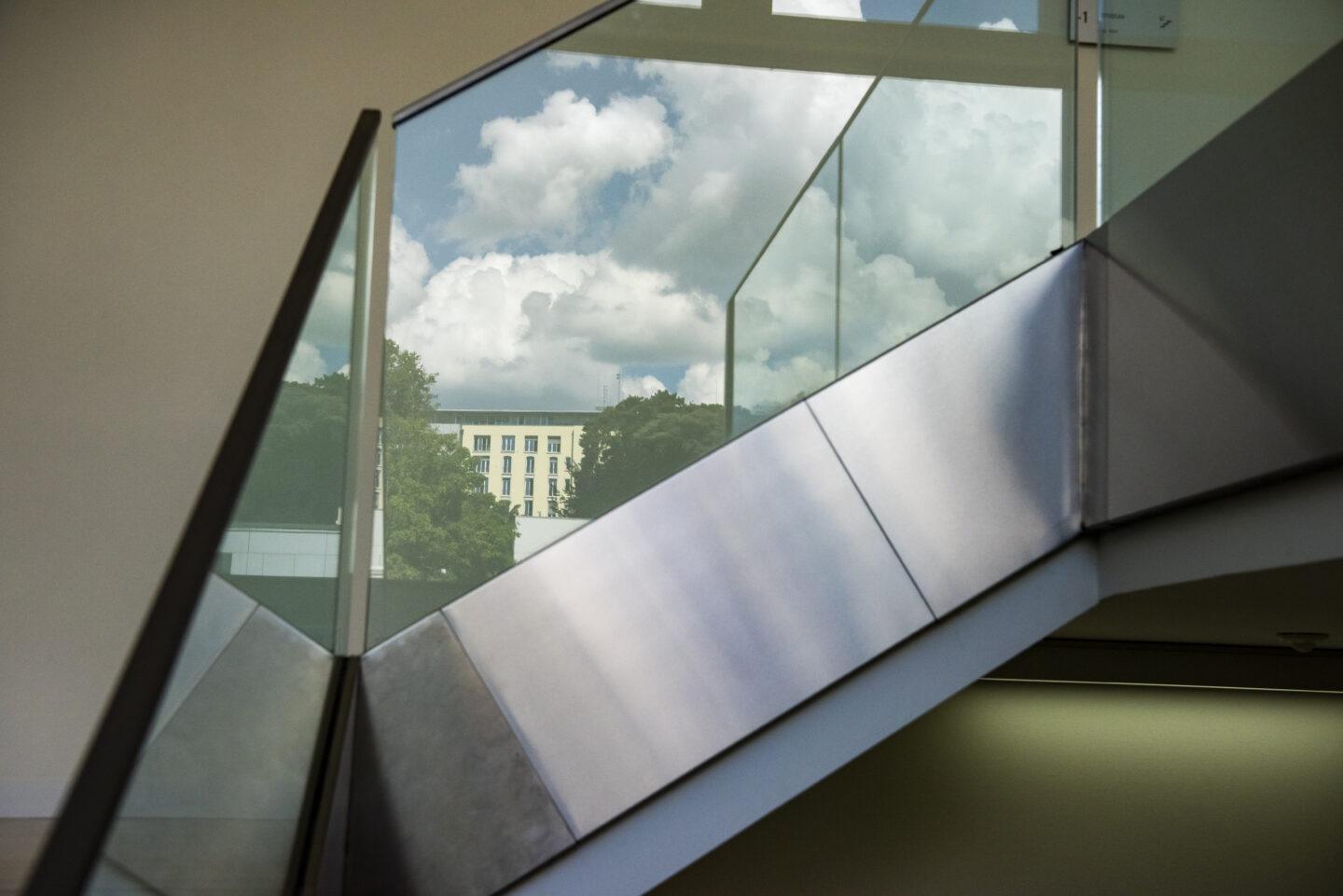
Reducing
In 2023 we will develop a strategy to reduce emissions and also focus on our ability to influence the behaviors of our key stakeholders and those traveling to our programs.
We have already put in place several initiatives to reduce our impact on the environment.
![]()
![]()

Cutting Our Energy Consumption
We are transitioning from gas to district heating for one of our campus buildings. This is part of Lausanne’s plan to provide 75% of households with 100% renewable and recovered heat by 2050. The Maersk Mc-Kinney Moller Center, IMD’s newest building on campus, is heated and cooled geothermally using water from Lake Geneva, a design that sets an environmental standard for future facility projects.
Other actions to reduce energy consumption on campus include:
- Transitioning to a fully automated lighting system equipped with motion detectors and low-consumption LED lights.
- Reducing standard heating temperatures in buildings and systematic shutdown of heating installations when the premises are unoccupied.
- Adjusting and reducing the operation hours of the heating and ventilation system using energy-efficient IT equipment.

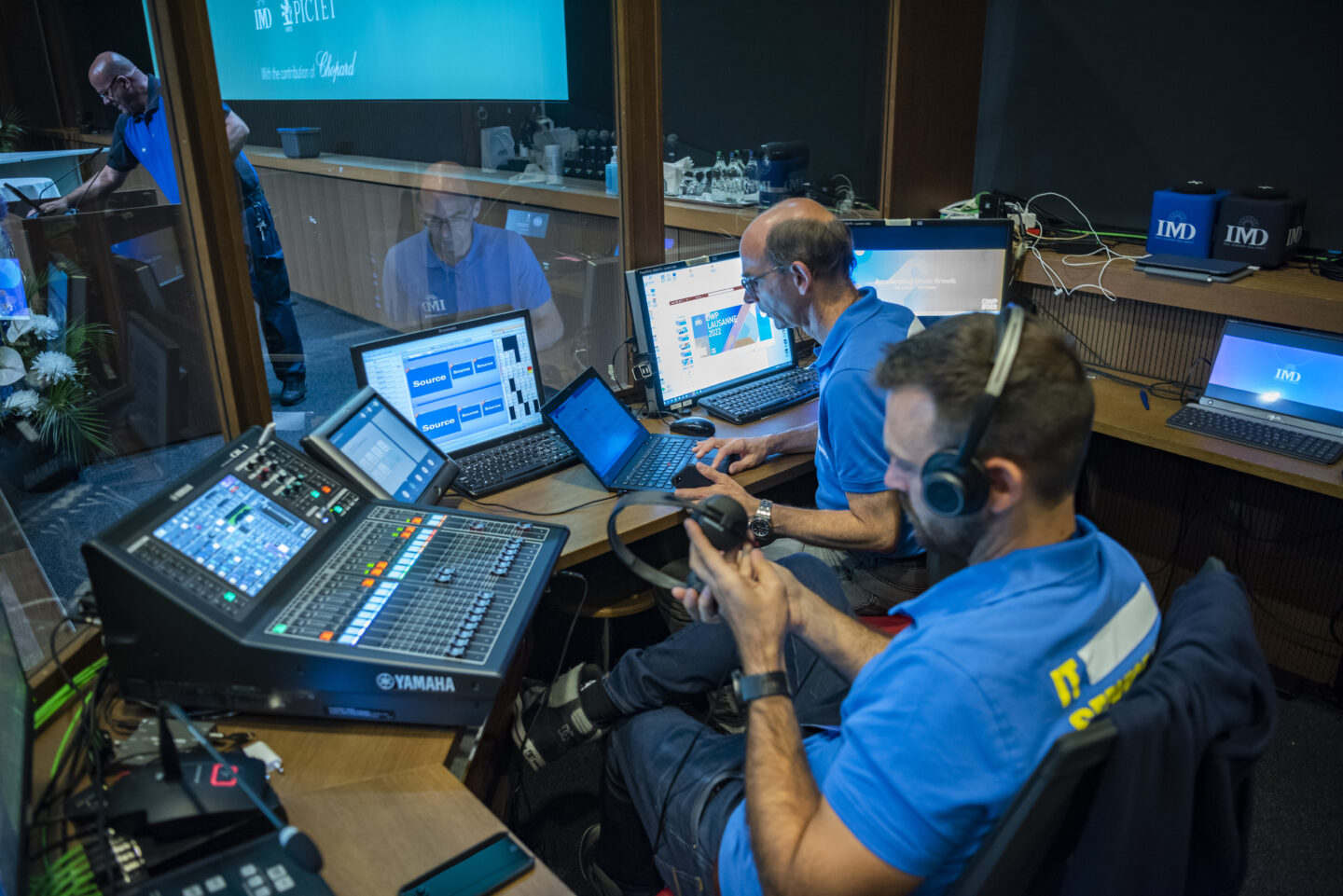
Cloud-First Digital Strategy
Part of our digital strategy is to increase the adoption of cloud-based services. In 2022, our IT department had 80% of servers in the cloud and it plans to close its two remaining data centers by the end of 2024.
We also migrated our web page (IMD.org) from an owned infrastructure to a modern and extendable cloud-based one.
Pre-migration, a typical IMD.org page with around 10,000 monthly visits produced 107.52kg of CO2 equivalent per year, the amount of carbon absorbed annually by five trees. Post-migration, the website now runs on sustainable energy and is cleaner than 69% of tested websites, and a typical page attracting 10,000 monthly visits only produces 33.95 kg of CO2 equivalent per year, a reduction of 68.4%.
A Balanced Approach to Travel and Technology
As the COVID-19 pandemic slowed in 2022, most travel bans were lifted, resulting in an increase in air travel. IMD employee air travel rose to 3.1 million miles on 1,784 flights in 2022 from 0.5 million miles on 384 flights in 2021.
Even though air travel increased, our workforce continues to use technological tools to combine working from home and our campus offices. The IMD community values sustainable travel, as an internal mobility survey showed. A third of our employees use public transportation when coming to campus and our carbon emissions from flights with Air France, KLM or Delta are offset.
CO2 Emissions by Month/Year
Total Number of flights
Distance travelled
CO2 Emissions
By investing in technology-mediated education, such as hybrid, as well as synchronous and asynchronous virtual delivery, we offer our clients more flexible options for learning. This flexibility is key to meeting the unique needs of our program participants and offering access to executive education regardless of ability to travel.
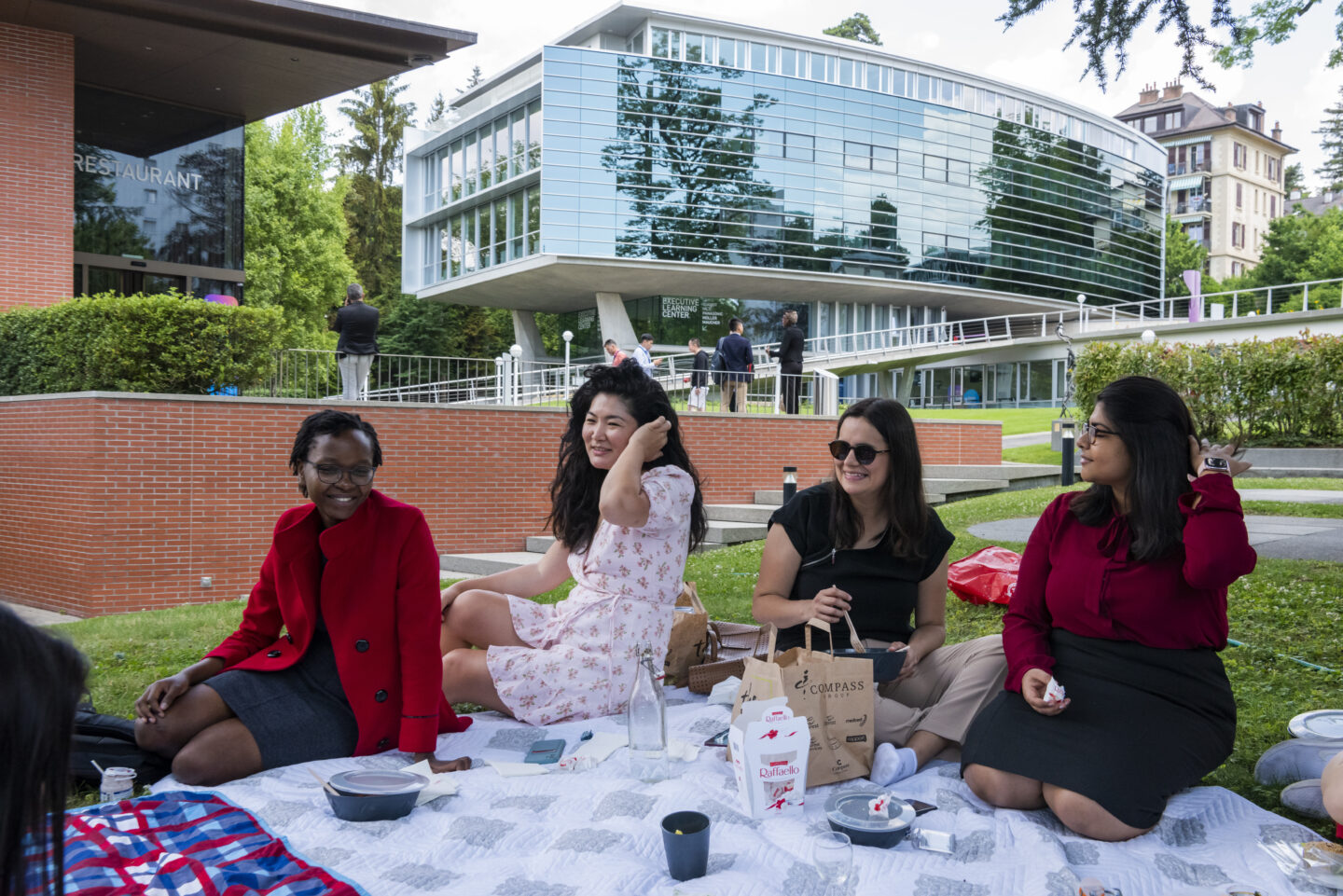
Reducing Waste and Increasing Recycling
Our approach to sustainability includes a strong commitment to reducing waste and increasing recycling. Our campus waste management system includes several waste sorting stations differentiating between paper, biodegradable waste, and non-recyclable waste. Glass and cardboard are collected separately by the city of Lausanne.
At our campus restaurant we separate organic household and vegetable waste from incinerable waste.
This separation allows Ecorecyclage, a local waste recycling company, to recover, reprocess, and recycle the useful components to produce biogas and compost. The biogas is injected into the natural gas network, providing fuel solutions to the local community.
We have also removed single-use plastic on campus. At the IMD restaurant we use compostable cups and cutlery, as well as refillable glass bottles for the water fountains. We provide reusable catering lunch boxes for employees who prefer a take-away lunch.
Computers and laptops are reused and passed on internally. Outdated digital equipment (screens, computers, tablets) are given away to charitable associations or sold. Devices that have reached the end of their life cycle and can no longer be used are disposed of and recycled by an organization that contributes to the reintegration of people into society.
IT hardware recycled
Over 3 tons
Total amount of waste in 2022
Total amount of waste: 2021 vs. 2022
(Tons)
Sustainable Catering
The IMD restaurant, which serves program participants and employees, focuses on healthy ingredients and local and regional food sources, and prioritizes environmentally friendly and local suppliers certified by the Bio-Suisse label. The restaurant aims to minimize the over-production and waste of food by reusing leftovers into different dishes or salad bar options.
The daily menu provides meat, vegetarian, vegan, and plant-based (meat alternative) meal options. In 2022, 65% of daily menus were vegetarian meals. By choosing to serve more plant-based meals, IMD’s restaurant contributes to reducing greenhouse gas emissions at source.
![]()
Origin of our meat and fish
100% Swiss pork, veal and beef
80% Swiss poultry
100% MSC labelled fish
Sustainable Procurement
We aim to integrate sustainability throughout our supply chain. Our guidelines for sustainable procurement require contracts with suppliers that are environmental leaders in their respective markets and comply with fair, ethical, and socially responsible practices.
In 2022, we purchased 19% of consumables from Lyreco’s green products line, which complies with ISO 14020, the highest level of ISO Environment Claims standards.
IMD’s sustainably procured products include:
- notebooks made from FSC-certified recycled paper and regenerated leather from plant-based fibers
- pens manufactured in Switzerland made from recycled mineral materials from construction industries
- reusable water bottles from Impact, a company that donates 2% of its sales to water.org, a global NGO providing access to safe water and sanitation to people living in precarious situations.
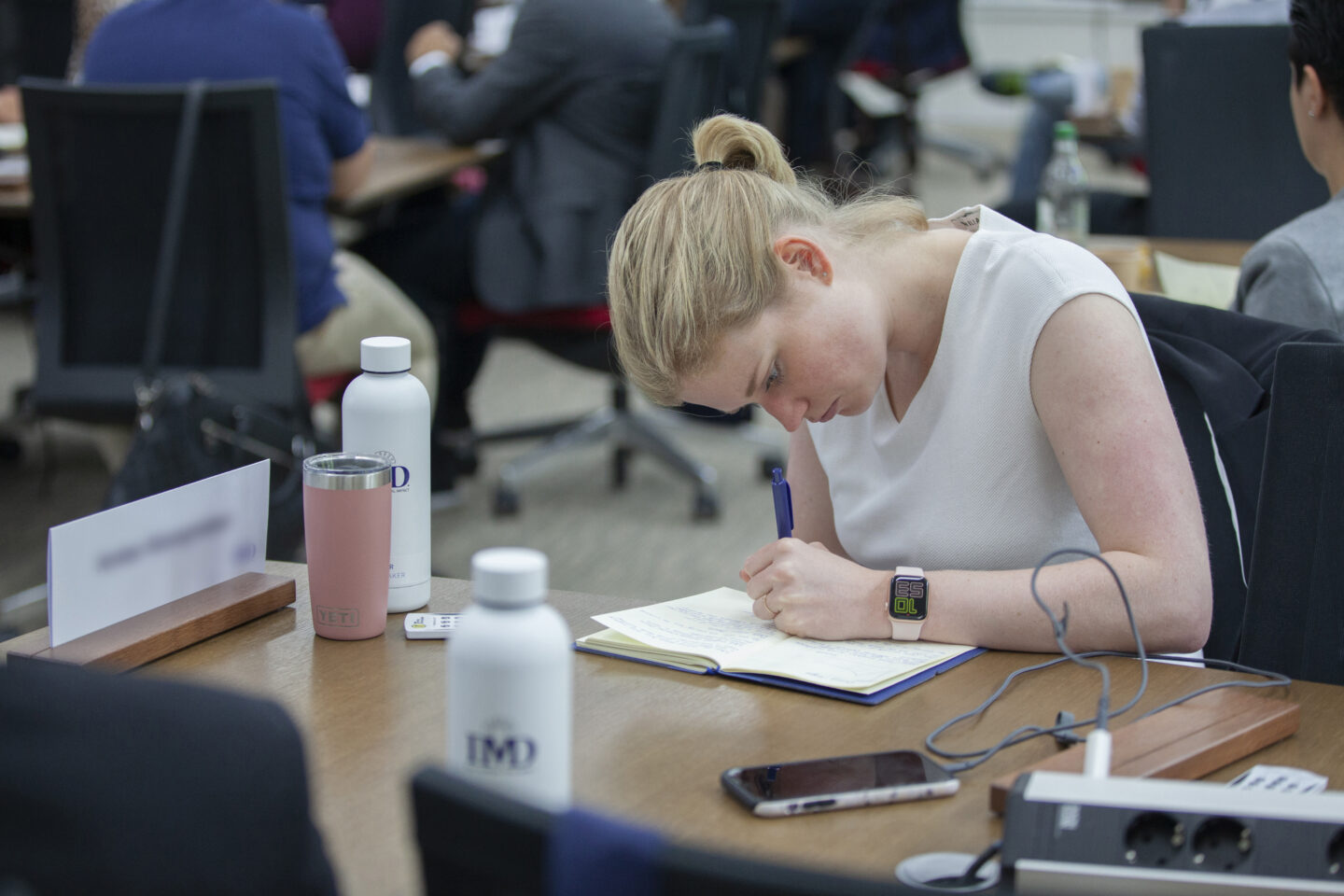
Promoting Biodiversity on Campus
![]()
We have implemented measures to promote and preserve biodiversity on campus since 2015 with specialists in the design of natural gardens.
The measures include:
- Green roofs, dry stone walls, flowering meadows and several grassed areas
- The preservation of old trees and the installation of insect hotels
- A perennial flowerbed was planted in 2022 to attract different pollinating insects
- Joining the “Arbres connectés” project, supported by Swiss innovation agency Innosuisse, to develop and deploy a 24-hour a day, non-intrusive tree monitoring system, with live viewing via smartphone and an alert system in case of an emergencies such as falling trees. Monitoring devices were installed on three tall cedars on IMD campus, benefiting our community by preventing accidents from falling trees. This proactive tree care improves our surroundings and maximizes the environmental benefits offered by our stock of trees.
In 2023, we plan to build a living fence, providing habitat and food as well as nesting and overwintering spots. Future projects also include the elimination of invasive plants and planting more trees for canopy improvements.
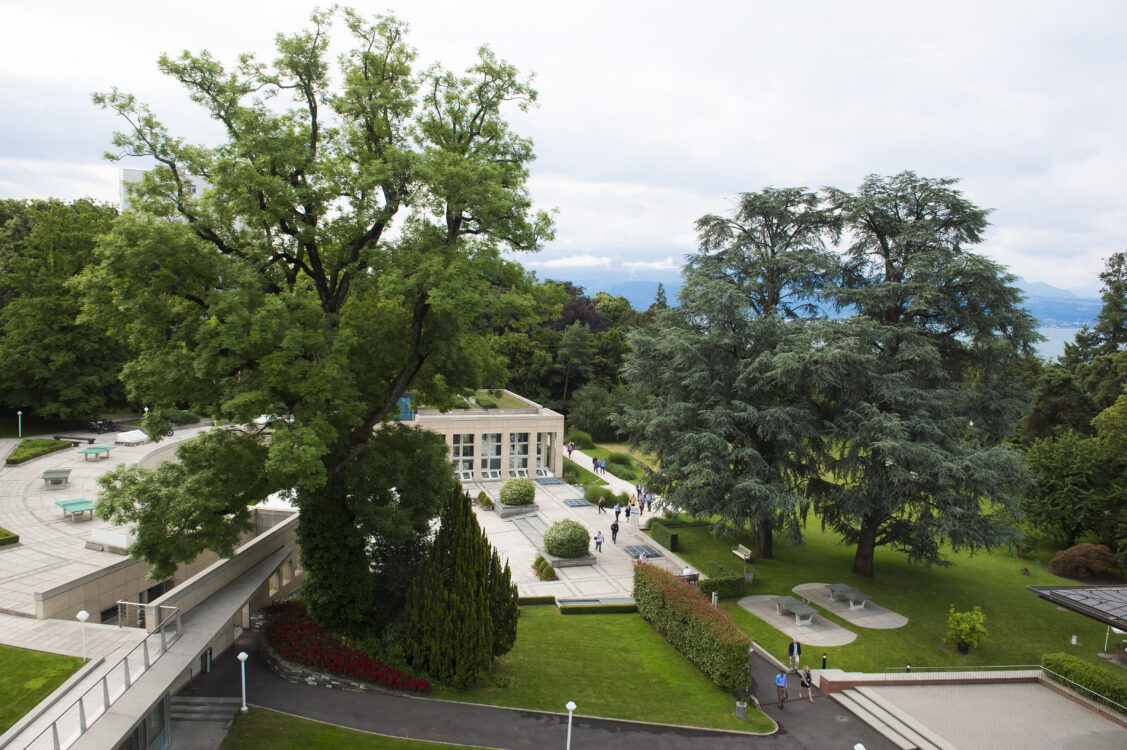
Next Steps
The carbon footprint analysis completed in 2022 serves as the cornerstone for our climate strategy. We are identifying a range of high-impact initiatives to reduce our carbon footprint and promote sustainability across all aspects of our operations. We prioritize the implementation of energy-saving technologies, renewable energy, and regular maintenance of our buildings, and encourage the use of sustainable transportation.
Moving forward, we are dedicated to improving our emissions calculation and reporting processes to ensure accuracy and transparency. In 2023, we will track our progress and set ambitious targets to continuously reduce our emissions. We will also work with our suppliers, partners, and clients to promote sustainable practices throughout our value chain.